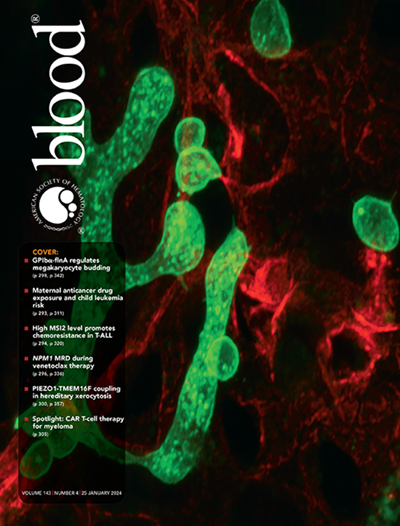A BCMA-mRNA vaccine is a promising therapeutic for multiple myeloma.
IF 23.1
1区 医学
Q1 HEMATOLOGY
引用次数: 0
Abstract
Cancer vaccines are emerging as promising therapies to not only prevent cancer but to treat cancer. Here, we developed a therapeutic vaccine for multiple myeloma (MM) using BCMA protein as a target. Given the remarkable efficacy of COVID 19 mRNA vaccines, we first packaged sequence- and base- optimized BCMA mRNA into lipid nanoparticles (LNPs) using next-generation ionizable lipid enhancing their accumulation in the spleen. A TLR3 agonist, polyinosinic:polycytidylic acid (Poly(I:C)), was also encapsulated in LNPs to further elicit BCMA-specific immune response. BCMA-mRNA LNPs were internalized by dendritic cells (DCs) in vitro, triggering proliferation and activation of BCMA-specific CD8+ cytolytic T cells (CTLs). Importantly, these CTLs lysed BCMA+ U266 MM cells and CD138+ patient MM cells, without affecting BCMA-knockout (KO) U266 or CD138- patient derived bone marrow cells. Vaccination of C57BL/6J mice with BCMA-mRNA LNPs activated splenic DCs and induced BCMA-specific CTLs, assessed by tetramer staining, which selectively killed murine 5TGM1 BCMA overexpressing (5TGM1-BCMA-OE) MM cells. Finally, vaccination of C57BL/KaLwRijHsd mice bearing BCMA-overexpressing 5TGM1 cells inhibited tumor growth associated with BCMA-specific CD8+ T cell responses. The combination treatment with Poly(I:C) further triggered the immune response induced by BCMA-mRNA LNPs in all instances. Our findings provide the framework for clinical evaluation of BCMA-mRNA LNP vaccines to improve patient outcome in MM.BCMA-mRNA疫苗是一种很有前景的多发性骨髓瘤治疗方法。
癌症疫苗正在成为一种有希望的治疗方法,不仅可以预防癌症,还可以治疗癌症。在这里,我们开发了一种以BCMA蛋白为靶点的多发性骨髓瘤(MM)治疗性疫苗。鉴于COVID - 19 mRNA疫苗的显着疗效,我们首先使用下一代可电离脂质将序列和碱基优化的BCMA mRNA包装成脂质纳米颗粒(LNPs),增强其在脾脏中的积累。TLR3激动剂polyinosic:polycytidylic acid (Poly(I:C))也被包裹在LNPs中,以进一步引发bcma特异性免疫反应。体外树突状细胞(dc)内化BCMA-mRNA LNPs,触发bcma特异性CD8+细胞溶解T细胞(ctl)的增殖和活化。重要的是,这些ctl能够裂解BCMA+ U266 MM细胞和CD138+患者MM细胞,而不影响BCMA敲除(KO) U266或CD138患者来源的骨髓细胞。用BCMA- mrna LNPs接种C57BL/6J小鼠,激活脾脏dc并诱导BCMA特异性ctl,通过四聚体染色评估,可选择性杀死小鼠5TGM1 BCMA过表达(5TGM1-BCMA- oe) MM细胞。最后,接种携带bcma -过表达5TGM1细胞的C57BL/KaLwRijHsd小鼠,抑制与bcma特异性CD8+ T细胞反应相关的肿瘤生长。在所有病例中,Poly(I:C)联合治疗进一步触发BCMA-mRNA LNPs诱导的免疫应答。我们的研究结果为临床评估BCMA-mRNA LNP疫苗改善MM患者预后提供了框架。
本文章由计算机程序翻译,如有差异,请以英文原文为准。
求助全文
约1分钟内获得全文
求助全文
来源期刊

Blood
医学-血液学
CiteScore
23.60
自引率
3.90%
发文量
955
审稿时长
1 months
期刊介绍:
Blood, the official journal of the American Society of Hematology, published online and in print, provides an international forum for the publication of original articles describing basic laboratory, translational, and clinical investigations in hematology. Primary research articles will be published under the following scientific categories: Clinical Trials and Observations; Gene Therapy; Hematopoiesis and Stem Cells; Immunobiology and Immunotherapy scope; Myeloid Neoplasia; Lymphoid Neoplasia; Phagocytes, Granulocytes and Myelopoiesis; Platelets and Thrombopoiesis; Red Cells, Iron and Erythropoiesis; Thrombosis and Hemostasis; Transfusion Medicine; Transplantation; and Vascular Biology. Papers can be listed under more than one category as appropriate.
 求助内容:
求助内容: 应助结果提醒方式:
应助结果提醒方式:


